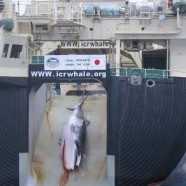Poincaré v. Montaigne
Information note n° 5
Whales at the International Court of Justice
The Hague, The Netherlands, 1st hearing of Japan July 2nd – July 4th
From June 26-28, Australia’s first round of hearings, issues on the purpose of scientific research and on the rationale of hypothesising were raised by the Court. The “positive” contribution to science of JARPA II was put into question. The objectives of the JARPA II program are considered by Australia to be the equivalent of “examining only the European red squirrel to understand what is happening to the European ecosystem” and science which is not built on solid ground. For memory, one of the objectives of JARPA II is to better understand biological parameters in the Antarctic ecosystem (see Information note N°1 for information on Japan’s JARPA objectives). Australia quoted Henri Poincaré, the French Professor, who wrote in 1905 that “science is built up of facts, as a house is built of stones; but an accumulation of facts is no more science than a heap of stones a house”. According to Australia, Japan’s collection of dead whales is not contributing to the stepping stones of scientific progress but a simple proliferation of useless stones.
Poincaré v. Montaigne
Information note N° 5
Whales at the International Court of Justice
The Hague, The Netherlands, 1st hearing of Japan July 2nd – July 4th
From June 26-28, Australia’s first round of hearings, issues on the purpose of scientific research and on the rationale of hypothesising were raised by the Court. The “positive” contribution to science of JARPA II was put into question. The objectives of the JARPA II program are considered by Australia to be the equivalent of “examining only the European red squirrel to understand what is happening to the European ecosystem” and science which is not built on solid ground. For memory, one of the objectives of JARPA II is to better understand biological parameters in the Antarctic ecosystem (see Information note N°1 for information on Japan’s JARPA objectives). Australia quoted Henri Poincaré, the French Professor, who wrote in 1905 that “science is built up of facts, as a house is built of stones; but an accumulation of facts is no more science than a heap of stones a house”. According to Australia, Japan’s collection of dead whales is not contributing to the stepping stones of scientific progress but a simple proliferation of useless stones.
Japan Strikes Back
Information note N°4
Whales at the International Court of Justice
The Hague, The Netherlands, 1st hearing of Japan, July 2nd – July 3rd
Japan, a country surrounded by sea, states that they “would be the last to misuse whales as resources because [they] know [they] benefit from the fruits of the sea”. Japan goes back in time explaining that they joined the International Whaling Commission (IWC) in 1951 “at a time when, amidst the devastation of war, whale meat helped prevent starvation” for a country with scarce land resources. They go even further back in time and point at the irony of history as it was whaling that forced them to interact with the international community after three hundred years of isolation. Japan stated that in the 19th century, “major maritime powers engaged in massive scale whaling demanded that Japan open up its ports to supply their whalers”. And it is this very subject, whaling, which today puts in question Japan’s compliance with the international community and international law and has brought them, for the first time, before the International Court of Justice.
Japan Strikes Back
Information note n°4
Whales at the International Court of Justice
The Hague, The Netherlands, 1st hearing of Japan, July 2nd – July 3rd
Japan, a country surrounded by sea, states that they “would be the last to misuse whales as resources because [they] know [they] benefit from the fruits of the sea”. Japan goes back in time explaining that they joined the International Whaling Commission (IWC) in 1951 “at a time when, amidst the devastation of war, whale meat helped prevent starvation” for a country with scarce land resources. They go even further back in time and point at the irony of history as it was whaling that forced them to interact with the international community after three hundred years of isolation. Japan stated that in the 19th century, “major maritime powers engaged in massive scale whaling demanded that Japan open up its ports to supply their whalers”. And it is this very subject, whaling, which today puts in question Japan’s compliance with the international community and international law and has brought them, for the first time, before the International Court of Justice.
Japanese “Scientific Whaling” by its Right Name is “Commercial Whaling”
Information note N°3
Whales at the International Court of Justice
The Hague, The Netherlands, 1st hearing of Australia, June 26th – June 28th
In his opening statement for Australia, Mr Campbell projected an image of a Japanese vessel with “Legal Research under the ICRW”* painted on the side and yet another whale lying dead on the slipway. For Australia, this is the image and language of a country trying to convince itself that they are contributing to science and thereby respecting the law. The international community and more specifically the international scientific community is not convinced.









